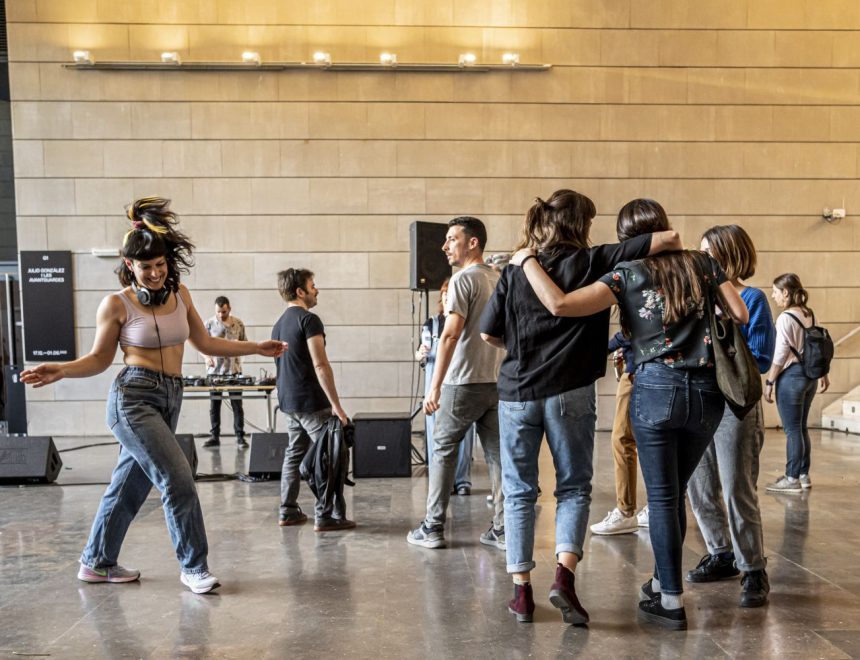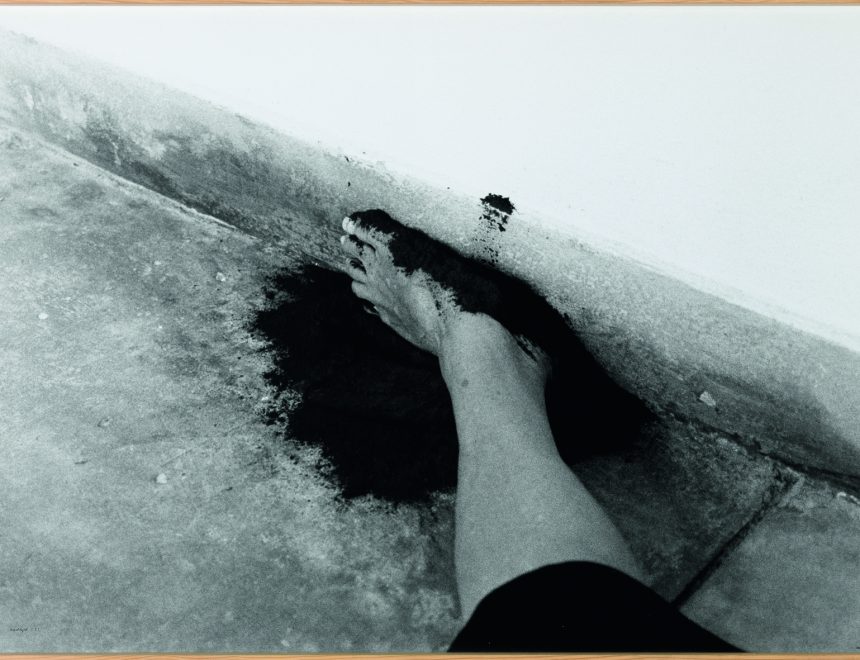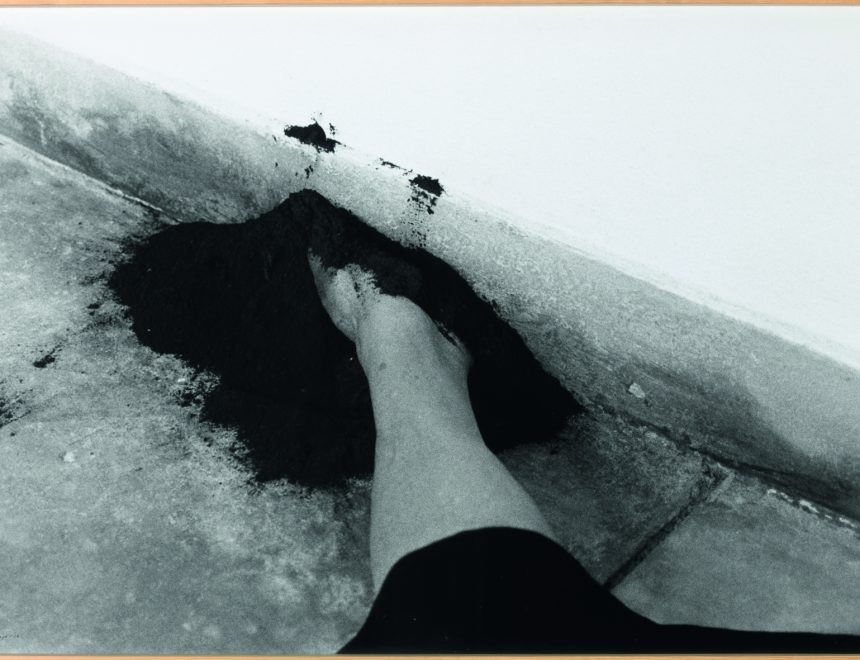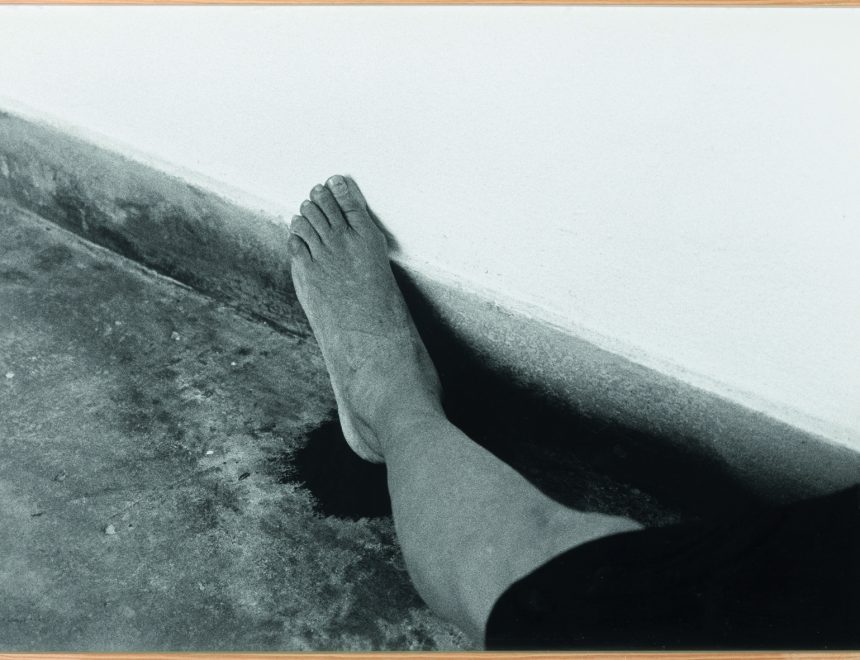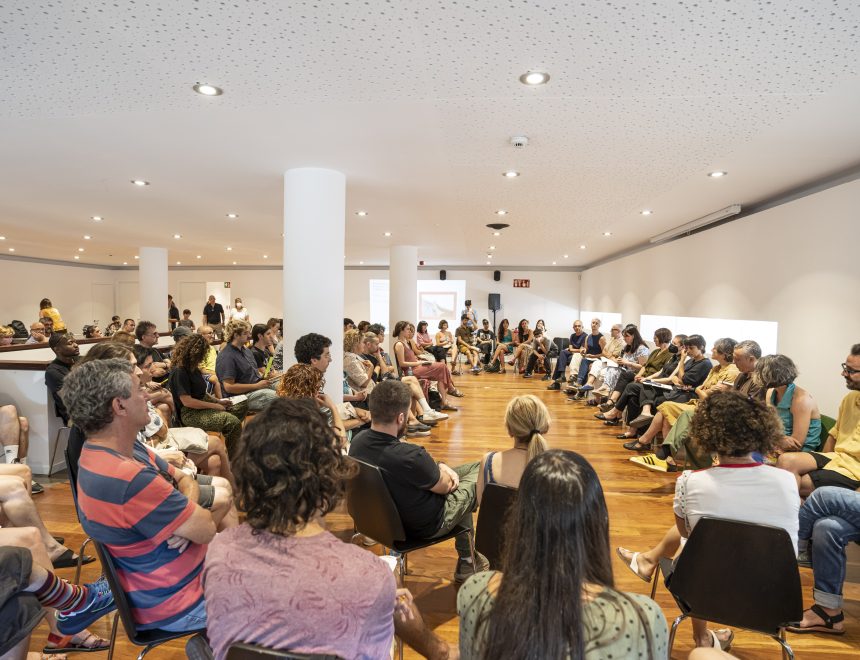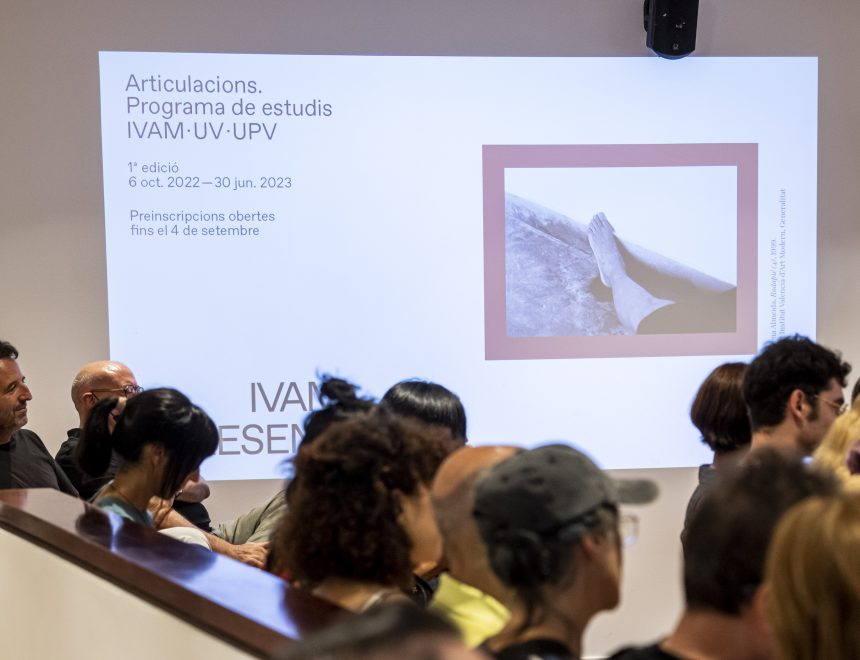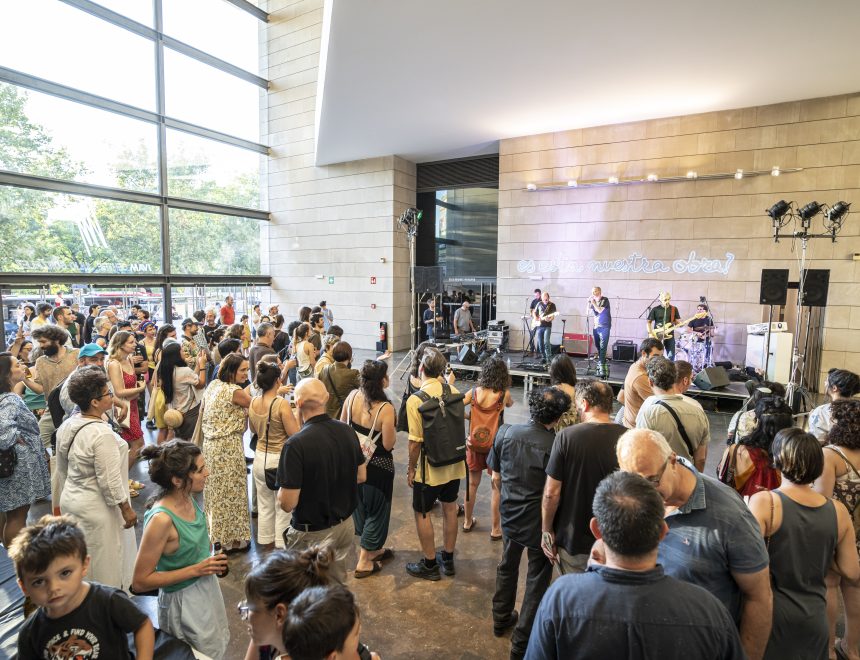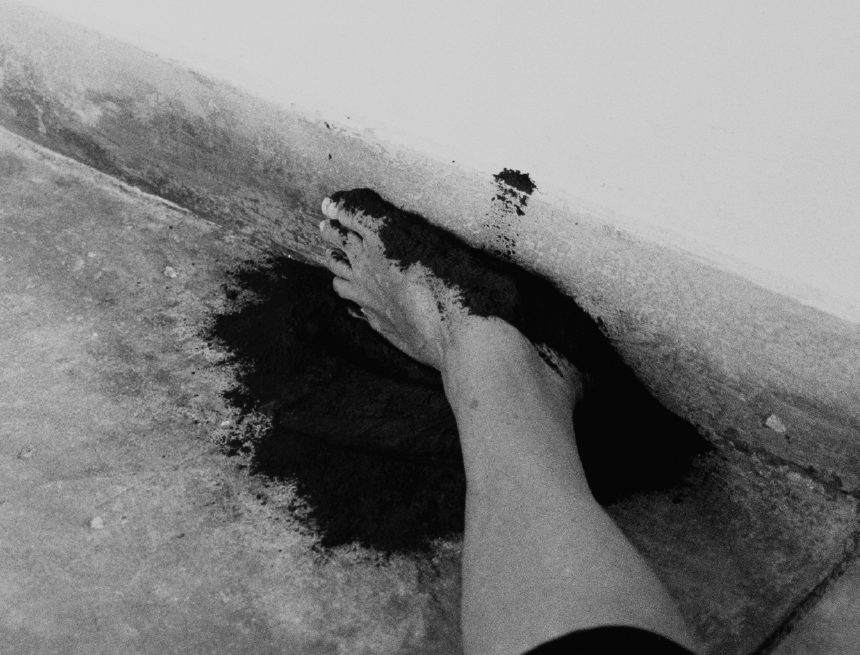
First edition from 6 October 2022 to 30 June 2023
Contemporary art is in constant friction with other areas of knowledge and cultural practices, questions of social interest and public space. These vertices converge in particular on a “metabolic museum” of the kind the IVAM hopes to propitiate: an institution traversed by crisis – economic, cultural and ethical – and transformation, a museum formed by a series of organs constituting a body that feeds off friction with other bodies in circulation. This is the spirit which inspires ARTICULATIONS, a programme created on the basis of two academic certifications: the first held during the first four-month term in collaboration with the Universitat de València, and the other in the second four-month term in collaboration with the Universitat Politécnica de Valencia.
As an international programme, although anchored in a specific territory, it aims to generate a learning context from which to confront the urgencies and uncertainties of a globally wounded present that requires new working methods and ways of inhabiting the world. The programme attaches importance to collaborative work precisely with the goal of learning from the people around us, developing ideas and giving shape to new forms of knowledge. Post-Identitarian feminisms, popular and decolonial practices, processes of globalisation and virtuality, speculative and collective narratives and the care of the planet are the frameworks defining the organisation of the four modules of the programme: Contemporary metabolic practices, Ruptures and remediations of discourse, Walking with the head, thinking with the feet and lastly a Final project.
Students who join the programme will form part of a heterodox institutional project focused on careful attention to processes of creation and thought besides results. In short, it will consist of a “doing with” a community of students, teachers with different academic backgrounds and professionals from the sector, from a variety of geographical areas, whose practices critically and incisively mould how contemporary art is understood, rehearsed and thought in its different expressions.
In this way, participants will acquire transdisciplinary critical skills that will allow them to analyse, design and create cultural projects of various types, both individually and collectively. The final projects of the programme will materialise at the IVAM and associate organisations, offering the chance to conduct a real programming practice.
MODULES
Contemporary metabolic practices
Through an immersion in the museum and contact with other social organisations, together with the practical knowledge of their professionals in the form of lectures, laboratories and workshops, the programme will develop a complex and critical vision of the changing artistic ecology operating both in the art centre and on the margins of the art systems, together with frictions and contaminations with other social spheres and contemporary political struggles. These metabolic practices will serve as a bridge between the museum and academe, but also between the institutions and reality, with the aim of combining the two theoretical and practical certifications.
Ruptures and remediations of discourse
Through talks, lectures, seminars and workshops, participants in the programme will be involved in a learning process that will open new paths for an understanding of the histories of art and its contexts, the genealogies of its cultural players, and the problems and disagreements affecting its production, organisation and classification.
Walking with the head, thinking with the feet
In this case, it will be the practical sessions that allow us to “digest” theoretical approaches with cultural practices of various kinds, both singular and plural. Together with the teaching staff, participants will thus produce an extended writing project in the first four-month term and a collective project in the second based on the knowledge shared previously within the framework of the programme (theoretical, practical and critical knowledge, management, mediation, artistic production, research, etc.). This heterodox experience, attentive to the context of art and its creative methodologies, will help to broaden the roles, tools and spaces that define what we call the contemporary.
ACADEMIC STAFF
Contemporary metabolic practices
IVAM: Tania Adam (journalist and cultural producer); Laura Benítez (researcher); Silvia Bottiroli (curator specialising in performance); Cooking Sections (artists); Joven de la Perla (artist); Isabel de Naverán (artist and writer); Yinka Esi Graves (flamenco dancer); Elvira Espejo Ayca (weaver, orator and director of the MUSEF); Radicantes (Mireia Ferrer, Rocío Pérez and Tatiana Clavel, caretakers of dance and other species); Diana Guijarro (curator), Alba Herrero (anthropologist); Yuk Hui (philosopher); Paco Inclán (writer and polyglot); Juan José Lahuerta (architect and director of the Gaudí Chair at the Universitat Politècnica de Catalunya); Teresa Lanceta (artist); Programa d’Art i Context (Ali A. Maderuelo and Julia Castelló, curators); Irene Llàcer (educator and programmer of the IVAM); Nicolas Malevé (artist and software activist); Raquel Manchado (artist and collector); Ana Penyas (illustrator); Suely Rolnik (psychoanalyst); Pedro G. Romero (artist); Carles À. Saurí (curator and director of the Espai d’Art Contemporani de Castelló); Clara Solbes (art historian specialising in gender studies); Dani Zelko (poet), ; María Puig de la Bellacasa (researcher), Clémentine Deliss (curator) y Confluències (Eva Bravo, arqueologist).
Ruptures and remediations of discourse
Universitat de València: Salomé Carvajal (researcher in training, University Institute of Women’s Studies), Mireia Ferrer Álvarez (lecturer in History of Art, Faculty of Geography and History); Anacleto Ferrer Mas (professor of Aesthetics and Art Theory, Faculty of Philosophy); Hasan G. López (lecturer in Aesthetics and Art Theory, Faculty of Philosophy); Carmen Melo (lecturer in Human Geography, Faculty of Geography); Eva Mompó López (lecturer in Education and School Organisation, Faculty of Education Sciences); Jaume Peris (lecturer in Spanish Literature, Faculty of Philology and Communication Sciences); Vicente Sánchez Biosca (professor of Audiovisual Communication and Advertising, Faculty of Philology and Communication Sciences); Nicolás Sánchez Durá (professor of Metaphysics, Faculty of Philosophy); Teresa Vicente Rabanaque (lecturer in Social and Cultural Anthropology, Faculty of Social Sciences); Vanesa Vidal (lecturer in Aesthetics and Art Theory, Faculty of Philosophy); Luis Vives-Ferrándiz Sánchez (lecturer in History of Art, Faculty of Geography and History).
Universitat Politécnica de València: Juan Vicente Aliaga (lecturer in gender, sexuality and politics in contemporary artistic practices, Faculty of Fine Arts); Eva Álvarez (lecturer in the Department of Architectural Projects of the UPV); David Barberà (lecturer in innovation and technology management at the Higher Technical College of Industrial Engineering); Carlos Gómez (lecturer of the Department of Architectural Projects of the UPV); Mijo Miquel (lecturer in Visual Theory and Practices in the Contemporary City, Faculty of Fine Arts); Marina Pastor (director of the Department of Sculpture, Faculty of Fine Arts); and Guillermo Ros (lecturer in sculpture at Faculty of Fine Arts).
Walking with the head, thinking with the feet
Migue Martínez García (researcher); Societat Doctor Alonso (Sofía Asencio and Tomás Aragay, dramatists and performers), Taller Placer (Paula Miralles, Vicente Arlandis, artists) and Laura Vallés Vílchez (curator, teacher of the Royal College of Arts and director of Concreta).
Final project
Nuria Enguita and Sonia Martínez (director and assistant director of the IVAM), Hasan G. López (UV), Eva Álvarez and Carlos José Gómez Alfonso (UPV), Sofía Asencio, Tomás Aragay, Paula Miralles, Vicente Arlandis, Migue Martínez García and Laura Vallés Vílchez (teachers on the module Walking with the head, thinking with the feet).
DOWNLOAD THE PROGRAMME HERE
QUALIFICATIONS: UV Certificate of Continuous Training (30 ECTS) + UPV Diploma of University Extension (30 ECTS).
DATES: 06.10.22 – 30.06.23
The study programme is designed to be followed jointly and consecutively at the IVAM. Each university will certify one four-month term. In the admission process, a favourable assessment will be given to those who express a desire to enrol for both certificates.
REQUIREMENTS: Interest in contemporary artistic practices, critical thought, aesthetics and histories of art.
No prior qualifications are required.
MODALITY: Presential.
TIMETABLE: Mornings (Wednesday to Friday. In some weeks, there may be sessions on Monday and Tuesday).*
* Possibility of optional complementary programming at the museum and associate organisations at other times.
PLACE: IVAM.
Some sessions may be held at the universities and other collaborating venues.
SELECTION PROCESS: Send a personal statement of interest (maximum one page) and/or a presentation video (maximum two minutes) to: Coord_ext_articulacions@ivam.es
